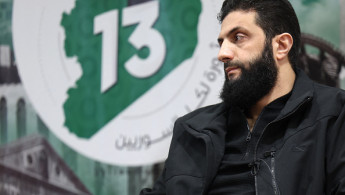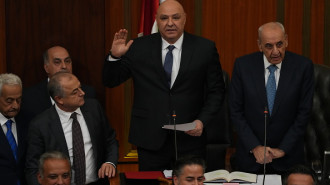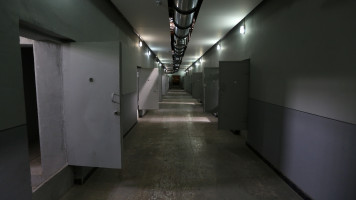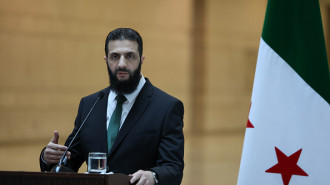Breadcrumb
HTS leader Jolani says rebel offensive will continue until overthrow of Assad regime
The leader of Syria's hardline Islamist rebel group Hayat Tahrir al-Sham (HTS) said that the "goal of the revolution remains the overthrow of this regime" as rebels captured the city of Hama and advanced on Homs, a former centre of anti-regime protest.
Abu Mohammad al-Jolani, whose real name is Ahmed al-Sharaa, made the comments in an interview with CNN broadcast on Thursday — his first since the start of the rebel offensive that began on 27 November.
"The seeds of the regime's defeat have always been within it," he said, adding "the Iranians attempted to revive the regime, buying it time, and later the Russians also tried to prop it up. But the truth remains: this regime is dead".
In the interview, al-Jolani distanced himself from his past membership of al-Qaeda in Iraq, fighting the US occupation of the country, as well as his role in founding Al-Qaeda's Syrian affiliate Al-Nusra Front.
"A person in their twenties will have a different personality than someone in their thirties or forties, and certainly someone in their fifties." he said when asked about his transformation.
Speaking about his experience in Iraq, he said that the US invasion galvanised many people to travel to Iraq, including him. However, "when I returned to Syria, I didn't want to bring what happened in Iraq into Syria, that's why there were disagreements between us and ISIS".
In 2017, Al-Nusra Front transformed into HTS along with other hardline Islamist rebel groups and formally cut ties with al-Qaeda.
However, the US, Turkey and EU still consider the group a terrorist organisation, a label Jolani called "political". The US government has also offered a $10 million reward for the capture of al-Jolani.
Al-Jolani also spoke about Syria's minority communities, which have often been attacked by the likes of Islamic State during the war, saying "no one has the right to erase another group. These sects have coexisted in this region for hundreds of years, and no one has the right to eliminate them."
The interview with CNN comes amid a flurry of statements by HTS appearing to embark on another change in its image, with al-Jolani appearing in Aleppo following the city's capture from the regime of Bashar al-Assad on 29 November.
This includes statements targeted at Syria's minority groups affirming that they're integral parts of the country, as well as reports that Aleppo will be governed by civilians and that the group may dissolve itself.
On Wednesday, Dareen Khalifa, a Senior Advisor at the International Crisis Group quoted the leadership of HTS as saying that the city of Aleppo will be governed by a transitional body with fighters leaving the city and civilians taking up their roles in governing institutions.
The leadership was also quoted by Khalifa as saying, "the distinct social and cultural norms of the city, Muslims and Christians in all their diversity, will be respected".
"HTS is even considering dissolving itself in order to enable full consolidation of civilian and military structure in new institutions reflecting the breadth of Syrian society."
This point was also made in the CNN interview.
HTS has also issued a statement targeted at Syria's Alawi community, calling for the community to abandon the regime. President Bashar al-Assad and key members of the regime's military, political, and intelligence leadership are from the Alawi community.
The statement did not give Alawis similar assurances to other minorities.
Jolani also started using his real name following the rebel success in capturing the city of Hama on Thursday, using it to sign a congratulatory statement.
"We congratulate the people of Hama for their victory," the message said, signed "commander Ahmed al-Sharaa", rather than his nom de guerre.
In 2021 al-Jolani gave an interview to US broadcaster PBS where he confirmed that his real name was Ahmed al-Sharaa and that his nom de guerre was in reference to his family origins in the Golan Heights which were occupied by Israel in 1967.






![Anthony Blinken speech [Getty] Anthony Blinken speech [Getty]](/sites/default/files/styles/image_684x385/public/media/images/6263436E-8ACD-4D3C-9055-25A7BE79DD5A.jpg?h=d1cb525d&itok=fLHmHCRG)
 Follow the Middle East's top stories in English at The New Arab on Google News
Follow the Middle East's top stories in English at The New Arab on Google News


